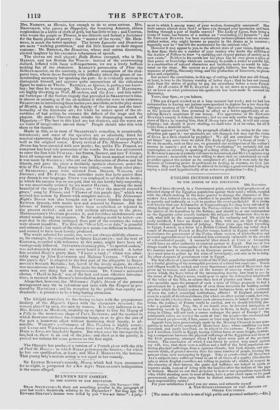BULWER'S NEW COMEDY.
TO THE EDITOR OF TILE SPECTATOR.
Lyndon, 12th Noventoer 1840.
DEAR SPECTATOR—Is there not something peculiar iu the paragraph of your last week's theatricals, relating to the Haymarket ? Not long ago, Sir EDWARD BULWER'S dramas were called by you " five-act farces' a judg- ment in which I, among many of your readers, thoroughly concurred'. Has their nature altered since then? or have you changed your spectacles, and been looking through a pair of double convex ? The Lady of Lyons, from being a tissue of trash, Ilas become of a sudden an " everlasting (?) favourite"; and Sir EDWAltD BULWER has been mysteriously metamorphosed into all accom- plished writer, who might become as popular in the drama as in romance s especially now he " has left the senthnental for the satirical vein."
However it may appear to you, in the altered state of your vision, depend on it, dear Spec. there are a number of your readers who doubt the abilities of. the Author of Pelham to draw "a sparkling and elegant picture of society aslt now exists." Neither in his novels nor his plays has he ever given a spice of that power or knowledge which are necessary to enable a writer to exhibit
in a combination of natural characters and incidents, such as would bo tole-, rated on the stage. His success as a playright, hitherto, has been the con- sequence of putting, Macready-izing, and the production of bizarrerie, to please• blues and exquisitcs.
Let us have the consolation, in this age of ratting, to find that one old friend, at least, is true to the literary worship of better days ; that he has not turned aside from the shrine of genius to pay his adorations before a mere French idol. At all events, if Sir E. BULVER IS to be set down as a genuine deity, let us know on what pretensions his apotheosis has been made to succeed his Baronetcy.
Yours, dear Spec., as you behave,
[This jeu in:sprit reached us at a busy moment last week ; and we bad less compunction in leaving our jealous correspondent to deplete for a few days the unhappy apostacy of his " old friend" Spectator to Bulwer-worship, inasmuch as the present week then promised to afford us a better opportunity, of re- solving BETA'S suspicions of our heresy. The appearance of Sir EDWARD BULWER'S comedy is delayed, however; and we can only soothe the apprehen- sions of BETA by assuring him, that if Money turn out bad, it will not escape clipping ; but should it prove sterling, we shall take it at its value, for all it issues from a doubtful mint.
What appears " peculiar " in the paragraphs alluded to is owing to the con- struction put upon it : our spectacles are not changed, but may not the vision of Bina be a little clouded by prejudice ? We did not commend the " five- act farces " any more than we culled This Lady of Lyons" a tissue of trash"; for on its merits, such as they are, we grounded our anticipation of the author's success in comedy : and as to the term " everlasting," we certainly did not contemplate an eternity in speaking of a thing of the day. The question of Sir E. 13 t:LWE ft'S success in comedy will soon be de tenni ned, and BETA'S opinion may prove correct : meanwhile we were willing to show that we entertained im such prejudice against the author as he complained of; and, if it were only for the pleasure of bestowing praise in preference to dealing in censure, we wish Win success. May not the Spectator be allowed to indulge a good-moored feeling by saying a civil word hypothetically of an unknown production?—ED.]


























 Previous page
Previous page